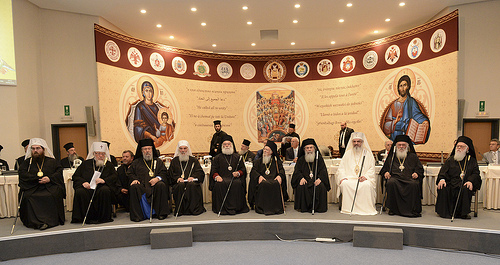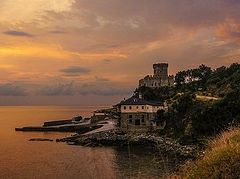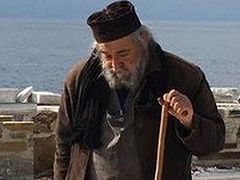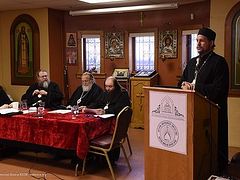Source: Orthodox Ethos
September 27, 2017
The Russian Orthodox Church Outside of Russia (ROCOR) invited the Protopresbyter Fr. Peter Heers, Professor of the Holy Trinity Seminary in Jordanville, New York, to speak on the Council of Crete at the yearly clergy gathering of the Diocese of Eastern America (3/21/2017),2 in the presence of His Eminence, Archbishop Hilarion, and several hierarchs.
Mr. Evangelos Sotiropoulos criticized Fr. Heers’s homily in a text that was published originally on the website “The Huffington Post” and in Greek translation on ROMFEA. Calling upon the fact that he had traveled to Crete, Mr. Sotiropoulos characterizes Fr. Peter’s criticism as “malicious words” containing “erroneous declarations, misleading statements, false equivalents and omissions”! Since, however, he has not offered sufficient support to his criticism, he is in danger of fulfilling the words of the psalm: “upon his own pate shall his unrighteousness come down…”
In more detail:
1. The number of participants in the Pan-Orthodox Council. Mr. Sotiropoulos takes issue with the speaker for his reference to the small number of bishops that participated in the Council (about 160 bishops). He did not, however, rightly perceive the blame of the Council with regard to the number of bishops nor the comparison to certain of the Ecumenical Councils! Of course the problem is not the number of participants itself, but why we have arrived at this number. Why should the number of bishop-members have been so limited when today there is no technical obstacle for a gathering together in one place, in Council, all Orthodox bishops in the world, the number of which does not surpass 900. If in 325, 451, or 787 AD, 318, 630, or 350 bishops respectively could and did come together, it is incomprehensible that 800 or 900 bishops could not come together in our day for such an event! Is it not?
Let us be sincere, dear ones! The limitation of the number of participating bishops has nothing to do with ecclesiological or theological criteria but with matters of phyletism, tactics, and political balances, or, to put it more simply, some of the organizers feared that if the participation of all Orthodox bishops was allowed the votes in their favor would not add up! Let us reflect on the number of bishops of the Church of Russia (368) and it will become clear why the participation of all the bishops in the Council of Crete was not allowed (One of the supporters of the Council, the hieromonk Dositheos, of the Holy Monastery of Tatarna, suggests the same thing, indirectly but clearly!) The criteria that decreed the non-participation of all the bishops were not based on ecclesiology but on phyletistic opportunism.
Yet we cannot pass over the serious ecclesiological issue that is raised, according to the Ecumenical Patriarchate’s leading theologian-bishop, Metropolitan of Pergamus John (Zizioulas), by the intentional exclusion of a portion of the bishops. The Metropolitan writes: “A Synod, therefore, is not an institution that lies above the local Church; it is an institution that expresses the unity, the coincidence, the consent and the reciprocation of local Churches. Something like this is secured – by way of structure and organization – by the rightful participation in Synods by all of the bishops… This is why – from an ecclesiological aspect – every kind of Synod that excludes the presence of bishops (unless there is an unavoidable historical necessity) from participating in a Synod, is considered a serious deviation. There have been – and there still are – such ecclesiologically unjustified deviations…But when a Synod can be comprised of all participants, and yet certain participants among them are chosen and are rendered masters over the remaining bishops – [it is] an act that corrodes very dangerously the foundations of Ecclesiology and creates anomalies and digressions. . .Naturally, the ideal situation is the assembling of all bishops.”3
2. “Great and Holy” or broadened “Council of Primates”? The phrase in Fr. Peter’s lecture, that the Council of Crete was a “Council of the Primates with their companies”, was borrowed from the Metropolitan of Nafpaktos, who justifies it fully in his well-documented intervention in the meeting of the Hierarchy of the Church of Greece (November, 2016),4 to which we refer Mr. Sotiropoulos. Of course, it is not we who belittle the bishops but the manner in which the Council operated, which compelled a moderate bishop of the Church of Greece to deny his participation in the representation because he does not want to be a “decoration”! Furthermore, the fact that on the official website of the Council all the bishop-members are shown as having signed the texts when in fact a significant number of them, more than 40, did not accept and did not sign the text on the “Relations of the Orthodox Church with the rest of the Christian World” shows no respect to the episcopal office! Finally, no respect is shown to the episcopal office when the Council’s organizers tolerated the Archbishop of Cyprus signing “in their stead” on behalf of those bishops who, in fact, refused to sign the above-mentioned text (see further down § 4 d).
...Read the rest at Orthodox Ethos.





